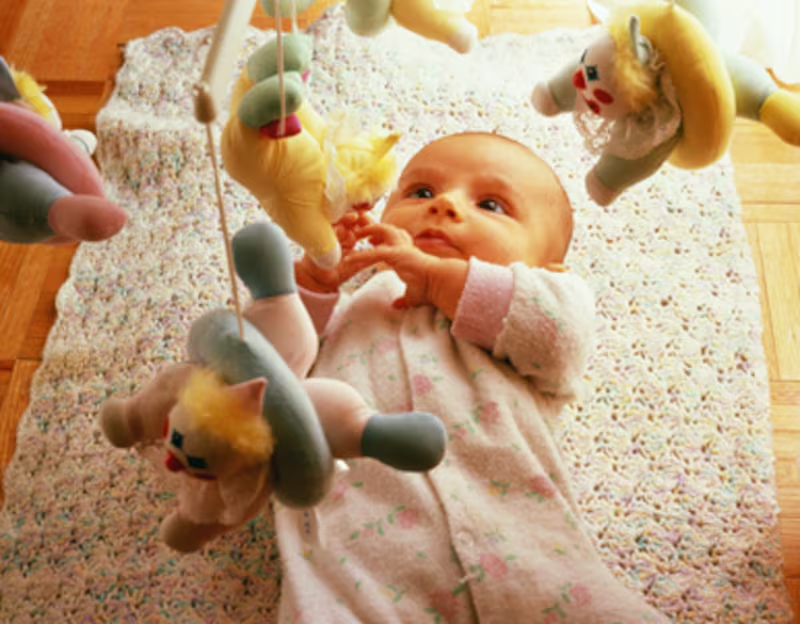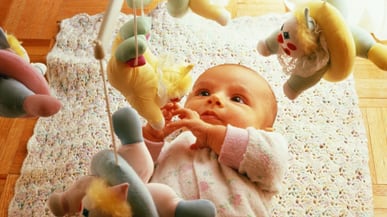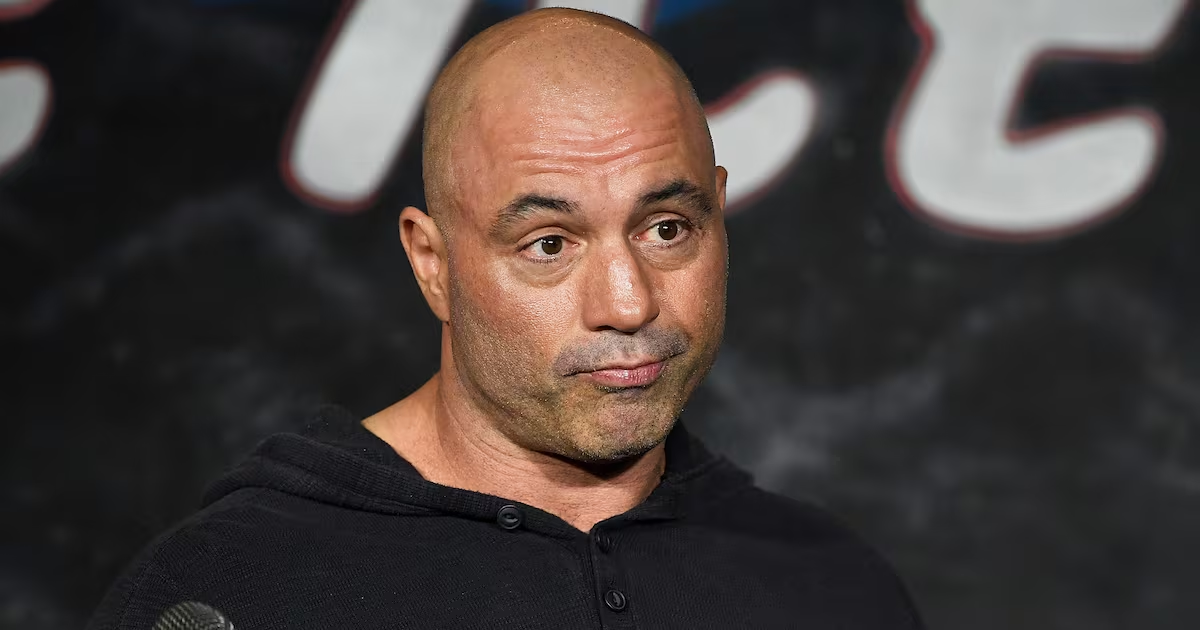Henry Molaison, known to the world as H.M., has been called the most important patient in the history of brain science. In 1953, doctors removed two slivers of tissue from deep in his brain to treat severe seizures. He woke up from the surgery transformed for life. His seizures were gone, but from the time of his operation at the age of 27 until his death two years ago at 82, H.M. had no ability to form new memories.
He could reminisce about his childhood, or talk about life during World War II, but new experiences stayed with him for about 20 seconds and then vanished. A small team of researchers studied him for decades—one described H.M. as being "part of the family." But still, each visit they made felt to Henry like it was the first.
Babies have long been thought of as little H.M.s—creatures of the moment who don't have the brain capacity to remember things for more than a few hours or days. In fact, I described them this way myself when I wrote about infant memory two years ago for Babble. The idea was that little kids are amnesiacs; their hippocampus—the part of H.M.'s brain that doctors unknowingly removed—isn't mature yet, so new experiences don't stick.
But this may soon be an old-fashioned notion. Scientists who study infant memory are gathering around the idea that not only are babies not forgetful, but under the right circumstances, they can form memories that last for incredibly long periods of time. And even though when they grow up they might not consciously remember their diapered days, the memories that children form in the first years may actually be the ones with the greatest impact on their lives.
• 2010’s Hot Boy Baby Name TrendTo test the memory skills of the tiniest subjects, researchers employ one of an infant's favorite pastimes: kicking. In her lab at Rutgers, pioneer memory researcher Carolyn Rovee-Collier designs experiments that use kicking and other baby behaviors to measure memory strength in the first years of life.
A French physiology team found that toddlers prefer smells they were exposed to in the first weeks of life.
The basic setup: A baby is placed on her back in a crib with a ribbon around her ankle that is also tied to a mobile. When she runs her legs, the mobile moves and dances. Even a newborn learns to kick faster for maximum fun. After a break, the researchers come back, only this time they put the mobile back in her crib but don't attach it to her foot. Most babies start kicking furiously again at the sight of the mobile, remembering the game from days before. When Rovee-Collier started these studies decades ago, she found that two-month-old babies could remember for a day or two, while a six-month-old would remember for about two weeks, and a nine-month-old, for a month and a half.

But more recently, her lab has found a way to increase a memory's staying power. If the researchers just show the baby the mobile periodically (without allowing her to work it and re-learn the skill), a two-month-old baby will remember through seven months of age. And one of Rovee-Collier's graduate students, in a study using a train set instead of a mobile, showed that with only one learning session, six-month-old babies remembered how to work the train through their second birthdays.
Findings from other labs are helping build the case for far-reaching early memories, too. Earlier this year, for example, a French physiology team found that toddlers prefer smells they were exposed to in the first weeks of life.
"You can't compare babies to amnesiac adults," says Rovee-Collier. "Babies are not brain damaged—their memory is adapted to be exactly the kind of memory they need for early life." They're much more sophisticated than we give them credit for, she says, and their brains are set up to learn quickly and make rapid associations.
H.M. could learn and make associations, too, which baffled the scientists who studied him. For example, he mastered the ability to draw while watching only his hand in a mirror. Each time he did it, he got better at it—even though he always thought it was his first try at the exercise.
His "implicit" memory system was intact, meaning he could acquire subconscious knowledge and ability. Implicit memory is how you can parallel park your car or play a guitar without much thought. Most of what we traditionally refer to as memory is "explicit"—our conscious recall for facts and events, like what you ate for breakfast, or how you spent your summer vacation. The two memory systems explain why, for example, you remember how to ride a bike, even though you might not remember the day your parents took the training wheels off.
It's true that babies don't have a mature hippocampus, but in recent years, Rovee-Collier's studies have shown them to be capable of feats traditionally considered "explicit" anyway. For example, young babies are able to mimic a researcher's actions from days before. After watching an adult play with a toy, a baby will repeat the motions later on, even if she never touched the toy herself. A six-month-old will mimic a demo 24 hours later, and a 15-month-old baby will remember this after a four-month delay.
"We used to think babies only learned basic skills and couldn't retain memories over the long term," says Rovee-Collier. "Wrong. They do it, they just don't use the same brain circuits we do."
Part of the reason early memories fade is that infants grow and change so fast that their environment is constantly shifting, too. The mobile and train experiments repeatedly put them in the same context, but think about how fast a baby's skills, playthings, bedroom—everything —change with time. Lise Eliot, neuroscientist and author of What's Going On in There, explained this to me by saying, "You're never that small again. You're not looking out the same crib bars anymore."
And it's no coincidence that our first memories—usually from the ages of 3 or 4—match up with fluent language. If you ask a 10-year-old if he remembers a wedding he was in at age 2, he might give you a blank stare. It's not because there's no information about the experience up there, though. It's because you're asking him to recall a memory in spoken language when that memory wasn't coded in words in the first place.
But the fact that we can't talk about our early years is beside the point. The important, influential memories—the ones that shape us—are not our conscious memories anyway.
It's our emotional memory, the patterns of feelings and relationships—"am I safe, is the world a good place, do I have my people around me"—that matter. The brain's memory systems are deeply intertwined with its emotional circuits (which are strong right from birth), so much of what we learn early on is an emotional understanding of how the world works. The feelings around events are much more powerful than the events themselves.
And just like the baby remembering the mobile if she's given prompts, the experiences that stick are the ones that repeat (in fact, with each reminder, memories get stronger). So the time your child got pushed on the playground, or the night you didn't pick him out of his crib when he was crying—these aren't game-changers. Kids are like little scientists who need lots of data to draw conclusions. How we relate to and nurture them over time is what makes the difference.
This is why early childhood has such a powerful effect on us, even though we remember so little of it. Our first years are when we build our emotional blueprint of the world, and we take that understanding with us through the rest of our lives.
Heather Turgeon is a psychotherapist and science writer. She authors the column The Science of Kids for Babble.





